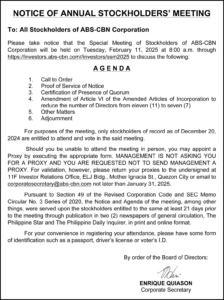THE SUPREME Court (SC) ruled that a lack of campaign funds does not justify branding a political hopeful as a nuisance candidate, emphasizing it undermines the constitutional right to equal access to opportunities for public service.
In a decision promulgated on July 30, 2024, publicized on Monday, the top court en banc said that “in a democracy, every citizen has a right to run for public office.”
However, this right must be balanced with the practical challenges faced by the Commission on Elections (Comelec) in ensuring free, fair and peaceful elections.
“The pivotal criterion that characterizes a nuisance candidate lies in the absence of a bona fide intent to run for public office, and it is incumbent upon the Comelec to identify and to adduce supporting evidence of acts or circumstances that show a candidate’s lack of bona fide intent to run for public office, with the objective of “prevent[ing] a faithful determination of the true will of the electorate,” the 15-page ruling penned by Senior Associate Justice Marvic M.V.F. Leonen read.
“It failed to discuss, much less adduce evidence, showing how petitioner’s inclusion in the ballots would prevent the faithful determination of the electorate’s will. We, therefore, hold that the Comelec acted with grave abuse of discretion in declaring petitioner as a nuisance candidate.”
The tribunal overturned Comelec’s resolution disqualifying an independent candidate in the 2022 presidential race.
Comelec had earlier declared the hopeful a nuisance candidate on grounds that he lacked the resources to sustain a nationwide campaign.
The candidate said his disqualification deprived him of his political rights and excluded voters from electing a candidate of their choice.
The top court upheld this view, saying that Comelec’s action violated the Constitution’s guarantee of electoral fairness.
The law bars nuisance candidates, individuals who are not genuinely running for office and instead aim to confuse voters or mock the electoral process, thereby disrupting the true expression of voter intent.
To classify someone as a nuisance candidate, the Comelec must present evidence demonstrating the individual’s lack of genuine intent to seek public office.
This determination may consider factors such as the candidate’s inability to organize a campaign, absence of political party nomination, or lack of a track record in public service, not his ability to fund a national campaign.
“The SC emphasized that regardless of wealth, everyone has the right to run for office. A candidate cannot be disqualified simply because they are poor. — Chloe Mari A. Hufana
















